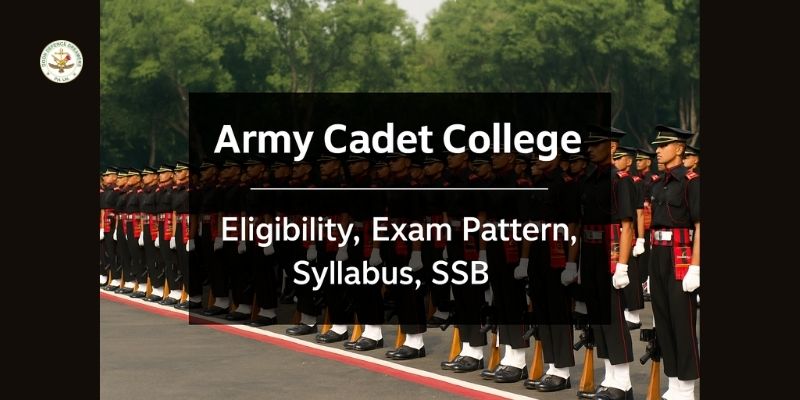Army Cadet College (ACC) Entry: Overview
For soldiers who dream of earning the stars on their shoulders, Army Cadet College is not just a training institution it’s a gateway from the barracks to the officers’ mess. Located within the Indian Military Academy (IMA), Dehradun, ACC transforms serving personnel from the Army, Navy, and Air Force into commissioned officers through a rigorous four-year process (three years of degree studies at ACC and one year of military training at IMA). It’s where courage meets intellect and discipline meets destiny.
It selects battle-tested candidates who’ve shown grit on the ground and curiosity in the classroom. From the four-paper written test to the five-day SSB, every stage measures your intellect, character, and leadership under pressure. Cadets live a rhythm of PT at dawn, lectures by day, and tactical drills by dusk—discipline becomes second nature. Mentors—seasoned instructors and officers—shape raw potential into polished command presence. The camaraderie built in those corridors lasts a lifetime and follows you to your first unit. For many, ACC is the moment where a soldier’s promise turns into an officer’s purpose.
ACC Notification & Application Dates (2026)
Typically, Army Cadet College notifications are issued twice a year through service channels. After the notice drops, the application form generally stays open for 4–6 weeks via your unit/Records Office. Written exams usually follow within 6–10 weeks of form closure, then SSB in the next cycle, with medicals and merit list thereafter. Always rely on your unit circulars and Records Office for exact cut-offs, form windows, and reporting dates (these can shift based on service requirements).
Quick Pattern (Indicative):
| Stage | Usual Window* |
|---|---|
| Notification to Units | Mar/Apr & Sep/Oct |
| Forms Open | Immediately after notification |
| Forms Close | 4–6 weeks later |
| Written Exam | ~6–10 weeks post form close |
| SSB & Medicals | Following cycle |
| Joining/Training | Next biannual intake |
*Exact dates vary; follow your unit/Records for official timelines.
Who Can Apply (Eligibility)
Understanding ACC eligibility is the first step. This entry is open only to serving personnel from the three wings of the Armed Forces. Candidates must have completed at least two years of service, possess a 10+2 qualification or equivalent, and demonstrate leadership potential through consistent performance and conduct. Both married and unmarried soldiers can apply, provided they meet the physical and medical standards prescribed by their respective service headquarters.
Commanding Officer’s recommendation, clean service record, and positive ACRs are essential. The medical category should generally be SHAPE-1, with required vision and dental standards met. No pending disciplinary cases are allowed — consistent Officer-Like Qualities (OLQs) such as initiative, teamwork, and integrity greatly improve the chances of shortlisting.
In essence, ACC eligibility is designed to identify not just physically fit soldiers, but mentally agile and morally upright individuals ready to lead from the front.
Age Limit & Service Tenure
To maintain a healthy blend of youth and maturity, Army Cadet College sets an age bracket of 20 to 27 years. Candidates must have completed at least two years of service at the time of application. The exact cut-off date varies slightly per notification, but the principle remains constant: only serving personnel with a proven track record are eligible.
A good service record, positive ACRs, and a recommendation from your superior officers are non-negotiable. Remember, ACC is not just a test of knowledge it’s a measure of character, consistency, and leadership displayed during service.
ACC Exam Pattern (Stage-wise & Papers) (2026)
The ACC exam pattern evaluates both knowledge and personality. The written test is followed by the SSB interview and medical examination.
Here’s a clear breakdown of the written structure:
| Paper Name | Subject | Duration | Marks | Type of Questions |
|---|---|---|---|---|
| Paper I | General Mental Ability | 2 Hours | 300 | Objective |
| Paper II | Current General Awareness | 2 Hours | 300 | Objective |
| Paper III | Interactive Communicative English | 2 Hours | 300 | Objective + Descriptive |
| Paper IV | Academic Content Test | 2 Hours | 300 | Objective |
Each paper carries equal weightage, and performance across all four determines your shortlist for the SSB interview. The written test focuses on reasoning, awareness, communication, and academic basics the pillars of officer training.
Detailed Syllabus (Paper I–IV)
The syllabus of Army Cadet College ensures a balance of intellect and general awareness. Here’s a summary of what to expect:
Paper I – General Mental Ability: Arithmetic, logical reasoning, data interpretation, coding-decoding, and series-based questions.
Paper II – Current General Awareness: Defence affairs, national and international news, Indian polity, economy, geography, and environmental studies.
Paper III – English: Grammar, comprehension, précis, vocabulary, letter writing, and short essays.
Paper IV – Academic Content: Class 10–12-level Mathematics, Science, and Social Studies concepts.
Candidates should revise NCERT textbooks, current affairs magazines, and defence journals regularly. A strong foundation and consistent reading habit help you score high in the written phase of the ACC exam pattern.
SSB Interview Process (Day-wise)
Clearing the written exam leads to the next challenge the SSB interview, a five-day evaluation of your personality and leadership qualities.
Day-1: Screening Test
Officer Intelligence Rating (OIR) and Picture Perception & Discussion Test (PPDT).
Days 2–3: Psychological Tests
Thematic Apperception Test (TAT), Word Association Test (WAT), Situation Reaction Test (SRT), and Self-Description.
Day-4: Group Testing
Group discussions, Group Planning Exercise (GPE), Progressive Group Task (PGT), Half Group Task (HGT), Individual Obstacles, and Command Tasks.
Day-5: Conference
All assessors discuss each candidate’s performance. Recommended candidates proceed for medical examination.
SSB tests the “whole person” your communication, decision-making, teamwork, and presence of mind. It’s not about rehearsed answers but about genuine leadership potential.
Preparation Strategy & Study Plan
Preparing for Army Cadet College while serving full-time is challenging — but completely achievable with structure and discipline.
1. Create a Balanced Timetable:
Divide your week: 4 days for academics, 2 for English and current affairs, 1 for revision or rest.
2. Strengthen Your Basics:
Focus on high-yield math topics (percentages, averages, time-work), general science, and reasoning.
3. Read Daily:
Newspapers, defence magazines, and editorials enhance vocabulary and GK critical for both the written and SSB stages.
4. Practice Writing:
Work on précis and essays to boost your English paper score.
5. Mock Tests:
Attempt at least 10–12 full-length papers based on the ACC exam pattern to simulate the real environment.
6. Physical Fitness:
Running, push-ups, chin-ups, and stamina training are essential for medical and training requirements.
Consistency matters more than intensity. A steady 90-minute daily routine is better than erratic late-night study bursts.
Important Dates & Application Timeline
The Army Cadet College exam is usually conducted twice a year. Applications are forwarded through unit Commanding Officers to Record Offices. After scrutiny, eligible names are listed, and call letters for the written exam are issued.
A typical timeline looks like this:
| Stage | Tentative Month |
|---|---|
| Application Submission | January / July |
| Written Examination | March / September |
| SSB Interview | June / December |
| Final Merit & Joining | January / July (following year) |
Always confirm the latest schedule through your Records Office or unit notices.
Documents & Medical/Physical Standards Checklist
Before you apply for Army Cadet College, ensure that all documents are updated and valid:
10+2 or equivalent certificate and mark sheets.
Commanding Officer’s recommendation letter.
Latest ACR summary and disciplinary clearance.
Service book extracts and personal details verified.
Medical category SHAPE-1 (no permanent defects).
Updated vaccination and dental check records.
Minimum Physical Standards:
| Parameter | Requirement |
|---|---|
| Height | 157 cm (relaxation as per service rules) |
| Weight | Proportionate to height and age |
| Vision | 6/6 in one eye, 6/9 in the other (correctable) |
| Running | 1.6 km in 6–7 minutes |
| Push-ups | 20 minimum |
| Chin-ups | 8–10 minimum |
Physical preparation should start early — not after receiving the call letter.
Doon Defence Dreamers Registration (How to Apply)(2026)
If you’re serious about cracking the Army Cadet College exam, enrolling with Doon Defence Dreamers can give you structured guidance and mentorship.
Registration Steps:
Online Form: Fill out your name, service, and education details on the official portal.
Assessment Test: Take a diagnostic test to identify your strengths and weak areas.
Customized Plan: Receive a personalized study schedule aligned with your posting and duty timings.
Mentorship: Get guidance from ex-defence officers, written exam experts, and SSB trainers.
Performance Tracking: Regular mocks, personality development sessions, and fitness plans to ensure all-round readiness.
Why Choose Doon Defence Dreamers?
Defence-focused faculty with proven success records.
Individual attention for serving personnel balancing duty and preparation.
Complete ACC syllabus coverage with smart notes and weekly mock tests.
Joining Doon Defence Dreamers means training in a disciplined, motivating environment that mirrors the ethos of the Army Cadet College itself.
Final Words
The Army Cadet College is more than just a selection process — it’s a transformation journey from a soldier to a leader. Every test, every parade, every sleepless night brings you closer to the stars on your shoulder. It rewards soldiers who combine courage with intellect and service with leadership.
If you meet the ACC eligibility, understand the ACC exam pattern, and prepare with sincerity and structure, there’s nothing that can stop you from becoming an officer.
Remember: “Once a soldier, always a soldier — but through ACC, you become a leader of soldiers.”





























